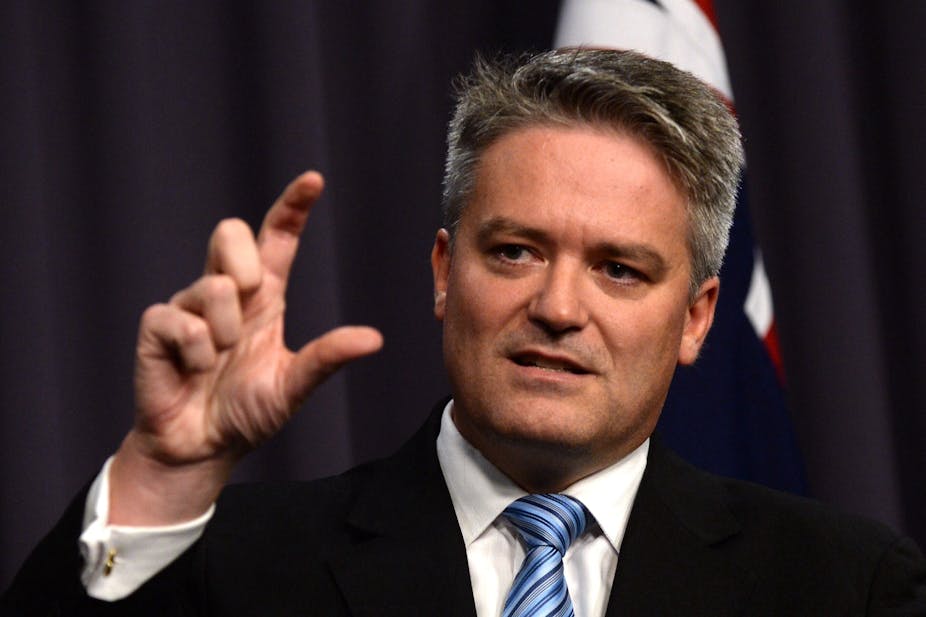Finance Minister Mathias Cormann today has effectively confirmed the budget will contain a tax levy on high-income earners and appealed to Australians to “trust” the government.
Cormann said the government understood why there was “a level of concern about possible tax measures”.
The budget would be pursuing structural reforms and savings, “but we also recognise that there is a need for an immediate special effort in order to put ourselves into a stronger starting position”, he told a news conference.
Initially the speculation was that the levy would hit those on $80,000 or more; more recently thresholds of $100,000 or $150,000 have been canvassed.
“That special effort needs to be spread fairly and equitably - and the only way you can ensure you do that is by also considering appropriately targeted measures through the tax system so that higher-income earners participate in the additional effort required,” Cormann said.
Cabinet met today to discuss the levy and other aspects of the budget, against the background of strong concern from Coalition backbenchers and a stinging warning from former treasurer Peter Costello about the dangers of imposing the levy, breaking Prime Minister Tony Abbott’s election promise of no tax rise.
Queensland backbencher Teresa Gambaro said the levy would breach the Coalition’s promise and have a devastating impact on the economy and on people’s confidence.
South Australian Liberal Senator Cory Bernardi re-entered the fray about the levy, saying “the ethos of the Liberal Party has always been about lowering taxes”.
Assistant Minister for Infrastructure Jamie Briggs dismissed Costello’s warning, saying the current task “is a lot more difficult than it was in 1996”.
He added: “Former footballers always claim that football was a better standard when they played and thus their comparative performance was always better. At the end of the day we are dealing with the contemporary situation that we were left.”
Cormann quoted from Costello’s 1996 budget speech, in which the then treasurer said that tightening measures had to be “fairly shared” and the (then) government was asking higher-income earners to make a contribution.
“Faced with the same challenges back in 1996, Peter Costello made the judgement that we think was right at the time and that we think is right now - that any effort to repair the budget mess left behind by Labor ought to be spread fairly and equitably across the community.”
Costello wrote this week that he regretted imposing the superannuation surcharge on higher-income earners in that budget.
Cormann stressed that the government’s measure would be temporary.
“Any special effort … will truly be temporary,” he said.
Cormann rejected the suggestion that the Prime Minister was not listening to backbench concerns about the budget, saying that Abbott, Treasurer Joe Hockey and cabinet were listening carefully and had made judgements in the national interest.
“What we’d ask people across Australia to do is trust us - that we are doing this for the right reasons.
"We’re not doing any of this for fun,” he said. The government was doing it to build a stronger and more prosperous Australia.
Asked about Gambaro’s and Costello’s argument that a debt tax would be a broken promise that would not deliver much economic gain, Abbott told reporters: “I’m confident that this is a budget that keeps our commitments, but above all else I’m confident that this is a budget that’s fair.
"I’m going to be able to look people in the eye on Tuesday night and on Wednesday morning and beyond and say, we are all in this together, we are all doing our bit,” he said.
“If we are all in it together, if we’re all chipping in something, we can chip away at the disastrous inheritance that the former government left our country.”
Shadow treasurer Chris Bowen said the OECD’s latest economic outlook, which has just been released, “rejects the need for deep and immediate budget cuts.
"The OECD notes that growth in 2014 will remain below trend and that employment remains soft in the near term. Against this backdrop the OECD explicitly warns against deep cuts to the budget.”

